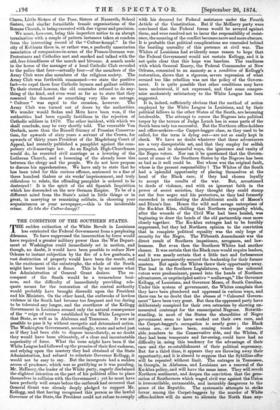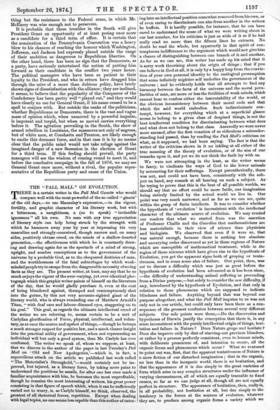THE CONDITION OF THE SOUTHERN STATES.
THEsudden extinction of the White Revolt in Louisiana has extricated the Federal Government from a perplexing dilemma. To have suppressed the insurrection by force would have required a greater military power than the War Depart- ment at Washington could immediately set in motion, and though, no doubt, it would have been possible to reduce New Orleans to instant subjection by the fire of a few gunboats, a vast destruction of property would have been the result, and in the excitement of the catastrophe, the whole of the South might have burst into a flame. This is by no means what' the Administration of General Grant desires. The re- conquest of the South would be a tremendous busi- ness, and the difficulty of immediately providing ade- quate means for the restoration of the central authority would probably have brought discredit upon the President and his Ministers. On the other hand, the outbreaks of lawless violence iii! the South had become too frequent and too daring to be tolerated any longer, and the overthrow of the Kellogg Government in Louisiana seemed only the natural consequence of the "reign of terror" established by the White Leaguers in that State, as well as in Alabama and Tennessee. It was not possible to pass it by without energetic and determined action. The Washington Government, accordingly, wrote and acted just as if they had been able to dispose immediately, as no doubt they would have been ultimately, of a clear and incontestable superiority of force. What the issue might have been if the White League had followed up the promise of their first rashness, and relying upon the mastery they had obtained of the State Administration, had refused to reinstate Governor Kellogg, it would not be easy to say. But the insurgents had a sudden access of prudence, which was as gratifying as it was puzzling. Mr. McEnery, the leader of the White party, eagerly disclaimed the slightest intention on the part of his political allies to place themselves in collision with the Government ; yet he must have been perfectly well aware before the outbreak had occurred that General Grant was already deeply pledged to support Mr. Kellogg, and that having recognised this person as the lawful Governor of the State, the President could not refuse to comply
with his demand for Federal assistance under the Fourth Article of the Constitution. But if the McEnery party were convinced that the Federal forces would be arrayed against them, and were resolved not to incur the responsibility of resist-. Mice, the meaning of the conflict becomes more and more obscure. It is probable that political complications are concealed behind the bustling unreality of this pretence at civil war. The Whites of Louisiana had evidently some reason to hope that the Federal Government would not sustain Kellogg, and it is not quite clear that this hope was baseless. The readiness with which General Emery, the Federal Commander at New Orleans, consented to an amnesty as a condition of Kellogg's restoration, shows that a rigorous, severe repression of what seemed too like rebellion was not the policy of the Govern- ment. It is quite possible that other conditions may have been understood, if not expressed, and that some compro- mise moderately satistactory to the White League has been suggested. -
It is, indeed, sufficiently obvious that the method of action employed by the White League in Louisiana, and by their political fellows in the other States of the South, are becoming intolerable. The attempt to coerce the Negroes into political torpor by the terrors of Judge Lynch has in some parts of the South been only too successful. But the Northern office-holders and office-seekers—the Carpet-bagger class, as they used to be called, for the term is dying out—are not so easily kept in check. We have no doubt whatever that these adventurers are a very disreputable set, and that they employ for selfish purposes, and in shameful ways, the ignorance and vanity of the Negro voters. Nor can it be questioned that the Govern- ment of some of the Southern States by the Negroes has been as bad as it well could be. But whose wal the original fault, whose is the present responsibility ? The Whites of the South had a -splendid opportunity of placing themselves at the head of the Black race, if they had chosen loyally
to accept the results of the war. But, accustomed to deeds of violence, and with an ignorant faith in the power of secret societies, they- thought they could stamp out the free negro and his protectors, as they had formerly succeeded in eradicating the Abolitionist south of Mason's and Dixon's line. Hence the wild and savage enterprises of the Ku-klux Klan, chilling that Northern sympathy which, after the wounds of the Civil War had been healed, was beginning to draw the bonds of the old partnership once more closely together. The Ku-klux outrages had to be forcibly suppressed, but they led Northern opinion to the conviction that in complete political equality was the only hope of security for the Negro. The Fifteenth Amendment was the direct result of Southern impatience, arrogance, and law- lessness. But even then the Southern Whites had another chance. It was certain that the Black race would require leaders, and it was nearly certain that a little tact and forbearance would have permanently secured the leadership for their former masters. But again the Whites threw their opportunity away. The lead in the Southern Legislatures, where the coloured voters were predominant, passed into the hands of Northern adventurers, or unprincipled native "scallawags," like Governor Kellogg, of Louisiana, and Governor Moses, of South Carolina. Under this system of government, the Whites complain that they have been plundered and oppressed in various ways, and there can be no doubt that the abuses of "Coloured Govern- ment" have been very great. But then the oppressed party have deliberately conspired for their own ostracism by showing un- measured contempt for the emancipated Negroes. Notwith- standing, in most of the States the absurdities of Negro government seem to have worked out their own cure, and the Carpet-bagger's occupation is nearly gone ; the Black voters are, or have been, coming round in consider- able numbers to the Conservative side, and the Whites, if they had been temperate and far-seeing, could have had no difficulty in using this tendency for the advantage of their race and the re-establishment of their political supremacy. But for a third time, it appears they are throwing away their opportunity, and it is absurd to suppose that the SybiRine offer will be repeated without limit. The outrages in Tennessee, in Georgia, in Alabama, and Louisiana are a renewal of the Ku-klux policy, and will have the same issue. They will revolt Northern sentiment, and deepen the conviction that the gene- ration of Southerners which waged civil war against tha Union is irreconcilable, untameable, and incurably dangerous to the peace of the Republic. The systematic attempts to strike terror among the Carpet-baggers by the murder of White office-holders will do more to alienate the North than any- thing but the resistance to the Federal arms, in which Mr. MeEnery was wise enough not to persevere.
It is probable that these troubles in the South will give President Grant an opportunity of at least posing once more as a candidate for a third term of office. It is certain that the nomination of the Pennsylvania Convention was a heavy blow to his chances of reaching the honour which Washington, Jefferson, and Jackson had expressly placed outside the range of their ambition as dangerous to Republican liberties. On the other hand, there has been no sign that the Democrats, as a party, have seriously entertained the notion of putting him forward as their candidate in the conflict two years hence. The political managers who have been so patient in their loyalty to the President, and who in return have dragged him through the mire of a more than dubious policy, have lately shown signs of dissatisfaction with the alliance ; they are inclined, it seems, to believe that the popularity of the Conqueror of the Confederacy has been pretty well "played out," and they would have clearly no use for General Grant, if his name ceased to be a spell to conjure with. But outside the ranks of the politicians, whether Republicans or Democrats, there is the vast and vague mass of opinion which, when unmoved by a powerful impulse, is impotent and torpid, but when so moved carries everything before it. The agitation prevailing in the South, the show of armed rebellion in Louisiana, the massacres not only of negroes, but of white men, at Conshatta and Trenton, are likely enough to excite this dormant force, and in that case it is by no means clear that the public mind would not take refuge against the imagined danger of a new Secession in the election of Grant for a third term. If this feeling should prevail, the party managers will see the wisdom of coming round to meet it, and before the conclusive campaign in the fall of 1876, we may see General Grant once more, without a rival, the popular repre- sentative of the Republican party and cause of the Union.































 Previous page
Previous page